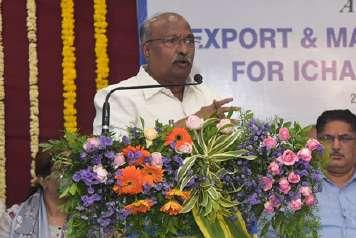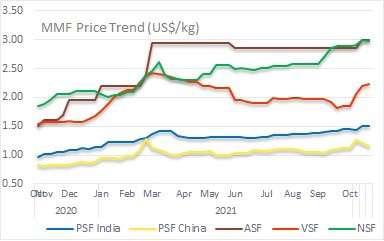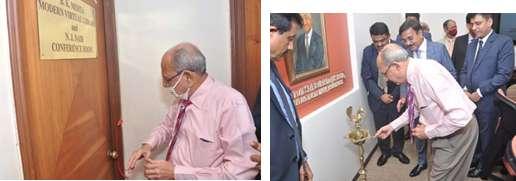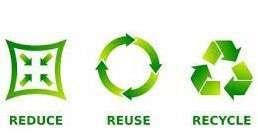
5 minute read
Caustic Circularity-A Game Changer for The Textile Industry - Mr. Vinay Patil
MR. VINAY PATIL
Advertisement
Managing Director, S.A. Pharmachem, Pvt.Ltd.
Caustic circularity is not only environmentally beneficial; it will also improve the textile industry’s competitiveness. Caustic circularity can be a game changer for the industry!
Application of caustic soda in Textile Industry and its Impact on fabric • Mercerization of Cotton Fabric
Enhanced dye affinity Improved fibre strength Enhanced air permeability Better Lustre Enhanced colour fastness Enhanced shrinkage resistance
• Scouring & Bleaching of Fabric
Removes impurities (natural & added) such as oils, fats, waxes, proteins, and pectin. Removes added impurities during sizing, and gives proper whiteness to product, and makes it highly absorbent for next process.
Recent Trends in Textile Processing
• Spent caustic is rarely recycled in majority of the textile processing facilities due to the heavy impurities / contaminants. • Spent caustic (wash liquor) is usually sent to the mill wastewater treatment plant or sold outside agencies at nominal price. This can be used either to generate NaOCl or purified and concentrated for recycle. • In general, when wash liquor is sent to ETP, it has higher pH which is neutralized by hydrochloric or sulphuric acid, resulting in increased cost of operation and TDS of effluent being discharged after treatment. • When spent caustic is sent to conventional CRP, plant technicians are not willing to reuse for processing of costly raw material due to impurities present in recovered caustic. • Operating cost (steam, power and scaling -down) of conventional CRP is very high.
Impurities Present in Spent Caustic
• Dissolved chemicals / sizing chemicals (during mercerizing of material at Grieg / half bleached stage) • Dyestuff (while dyed material is mercrized) • Cotton lint • Pectin • Oils, Fats & Waxes • Hemi-cellulose • Gassing dust from singed fabric
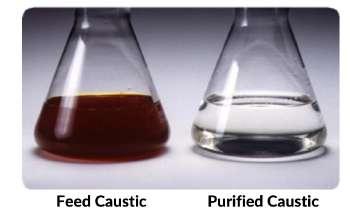
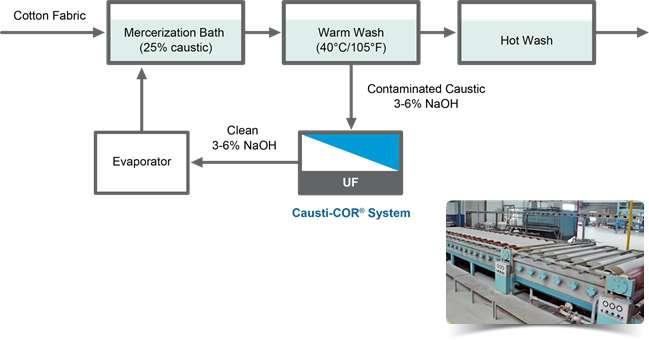
• Metals from machines and pipelines • Various metals from machines and pipelines
In short, recycling of caustic is not appreciated for quality product because of: 1) Quality of recycled caustic 2) Cost of recycling and treatment at ETP 3) Adverse impact on end product In order to resolve this issue, S.A. Pharmachem’s technical team has taken several trials and ultimately developed a full proof process for recycling of caustic. This new development is known as “Caustic Purification System”. Caustic Purification System (CPS)
Caustic purification system is designed
specifically to recover, purify and reuse caustic from various industrial applications. Koch Separation Solutions’ CausticCOR Nano filtration Membrane Systems offer a cost-effective, environmentally friendly way to recover the expensive caustic soda used in the textile processing and other industries like paper/pulp, food & beverage with extra purified stage at a comparatively lower cost.
Practical Experiences Using SelRO® Membrane
• >90% recovery • Reduction in total suspended solids around 49%.(at ETP primary collection tank) • Reduction in total dissolved solids around 9%(at ETP primary collection tank) • Reduction in COD around 55 %(at ETP primary collection tank) • Reduction in turbidity around 99% (recovered caustic is colourless & crystal clear) • Reduction in iron content around 45% (recovered caustic stage while compared to conventional CRP) • Compact design (required low space for installation) • Payback < 2 years (enjoy with quality of end product)
Process advantages of Caustic Purification System
• As the purified Caustic is free of impurities, it improves Caustic Recovery Plant overall efficiency. • It reduces steam consumption of CRP, • It reduces scaling inside CRP (less damage to equipment), • It reduces the cleaning frequency of CRP unit. • Lower frequency of cleaning of CRP, reducing downtime of the CRP unit. • It reduces acid consumption (required for neutralization at ETP) • It reduces load on ETP (TDS, TSS & COD).
• Strength of purified caustic remains ~ same as feed.

NEWS UPDATE
LEVEL PLAYING FIELD FOR DOMESTIC POLYESTER SPUN YARN ( PSY ) PRODUCERS : URGES NITMA
President, Shri Sanjay Garg urges the textile ministry that the domestic Polyester Spun Yarn manufacturers be given level playing field as the PSY imports is @ zero duty under ASEAN FTA from Indonesia & Vietnam, whereas polyester staple fibre is not included in the FTA which is cleared at full duty rate of 5%. Shri Garg, President NITMA along with a small delegation met with the Textile Secretary on 8th Nov 2021 and pleaded him to levy ADD on PSY at the rate of 5% due to the fact that Polyester staple fibre is not included in the FTA which is cleared at full duty rate of 5% whereas PSY imports are cleared at zero duty under ASEAN FTA from Indonesia and Vietnam and sought level playing field for the domestic industry. He stated that in the presence of this anomaly, domestic mills have no chance to compete with the imported goods. Imports are doubling every year since 2015 from 486 Tons/month to 5,109 Tons per month in 2020/2021. Current market share of imports has reached 25% of the total domestic consumption. In a matter of 1-2 years, it will significantly & thereafter completely wipe out the domestic polyester spinning industry. Shri Garg opined that alternatively, removal of basic custom duty on polyester staple fibre or its inclusion in the ASEAN FTA would also give a level playing field to the domestic industry. As both these options would take a long time to materialize, he appealed to the Textile Secretary that the anti-dumping be imposed till such time the FTA is modified to include polyester staple fibre or till such time that the basic custom duty on polyester staple fibre is removed. It is worth mentioning here that the Directorate General of Trade Remedies , after 18 months of elaborate investigations , has already recommended the imposition of duty on the same. Shri Garg advocated that domestic manufacturers do not require any undue protection or advantage over the imports but only thing that is needed is a level playing field. In order to protect the domestic industry and to create a level playing field , the rate of duty on input raw material and finished goods need to be the same ,which is currently not the case hence early imposition of the anti dumping duty is required. This move is necessary to not only revive the domestic spun yarn industry but also to save and protect the domestic industry thereby encouraging “ Make In India “ .

